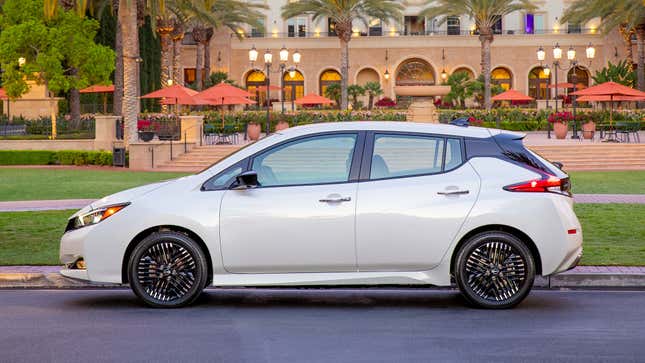
Poor Nissan Leaf. Being first never brought it success. Being cheap with decent range at a time when very few other electric cars are, also, hasn’t paid off. EVs have crossed over into the sort of mundane conversation you have with extended family over Thanksgiving dinner, and still nobody will give the Leaf any damn attention. Word on the street is it’ll be out of Nissan’s showrooms by mid-decade. That means the 2024 model-year Leaf could be the last one, or maybe second-to-last.
On Tuesday, Nissan formally announced what’s new for the 2024 Leaf: nothing. Nothing concerning the car, at least. The base Leaf S is $100 more expensive than it used to be, now $29,235 including destination. It offers 149 miles on a full charge. The only other trim is the SV Plus, which costs $37,285 — $150 more than last year’s. That one’s good for 212 miles.
The Leaf’s problem isn’t that it sucks, because it doesn’t. It’s that even in a segment with very few options, Nissan’s offering has never been the best. People are finally waking up to the Bolt in time for GM to kill it, and it’s almost $2,000 cheaper out of the gate, with far better range. The Volkswagen ID.4, while nobody’s favorite EV, is at least a shape most Americans would prefer and starts $3,000 higher. Just like the Leaf, both cars carry the full federal tax credit — as will the sub-$30,000 Chevy Equinox EV when it starts making deliveries in the coming weeks.
It hasn’t been easy for the Leaf, and it’s only bound to get harder. It’s still the only battery-electric car on the market today I can think of with a CHAdeMO port, which limits both the types of public terminals it can use and also the maximum charging speed it supports. Nissan’s also insisted on relying on air alone to cool the battery, which can seriously impact range years down the line, as I discovered when I spoke to a few owners of first-gen Leafs and other early mass-market EVs about their cars in 2021.
Nissan has thrown its full support behind the Ariya now, which seems wise. It’s also not the most stirring EV in its segment, and the company’s meeting some headwinds trying to churn out enough of them, but the Ariya is still an electric SUV with a starting price below that of the average new car. It’ll only further fall in price once Nissan finds a way to bring production stateside and get in on those incentives.
In the meantime, there’s still the Leaf, for now. If you have something important to tell it, do it now and not before you lose your chance.